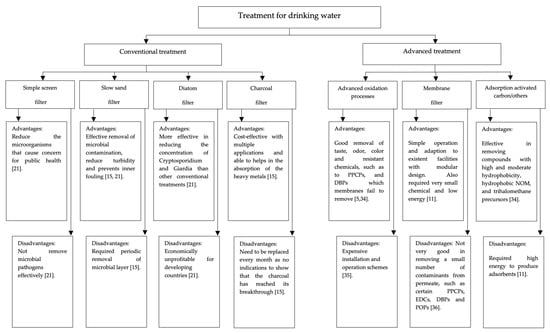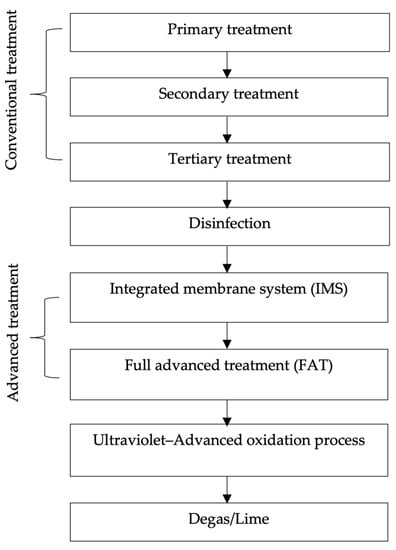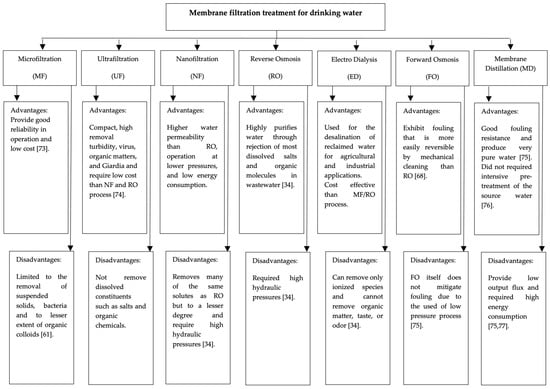Your browser does not fully support modern features. Please upgrade for a smoother experience.
Please note this is a comparison between Version 1 by Mashitah Che Razali and Version 2 by Camila Xu.
Water is one of the main sources of life’s survival. It is mandatory to have good-quality water, especially for drinking. Many types of available filtration treatment can produce high-quality drinking water. In general, the treatment technologies for treating water depend on the type of raw intake water that comes from various water sources, such as surface water and groundwater. Membrane filtration is an advanced drinking water treatment that is widely used nowadays in water treatment processes, mainly for drinking water.
- filtration
- drinking water
- membrane fouling
- fouling prevention
- fouling prediction
- fouling control
1. Introduction
The quality of drinking water resources is being enthusiastically addressed around the world since it is essential to health and development issues. Due to uncontrolled industrial waste and low public awareness, water pollutants can be discharged either directly or indirectly to water resources such as lakes, ponds, rivers, seawater, and groundwater, which later become contaminated. The contaminated or poor quality of drinking water can cause various infectious diseases and negatively impact our overall health [1]. According to the World Health Organization (WHO), contaminated drinking water can cause serious diseases such as diarrhea, cholera, dysentery, hepatitis A, typhoid, and polio [2]. It is estimated that around 502,000 people die each year from diarrhea due to unsafe drinking water. The quality of water resources has been gradually depreciating due to industrialization and urbanization [3]. It has become a crucial problem due to the difficulty of meeting effluent quality standards with conventional treatment processes [4][5][6][4,5,6]. Good-quality drinking water helps people achieve maximum body health and well-being.
To obtain high-quality drinking water, a good and reliable water treatment process is desirable. Traditional drinking water treatment includes five common units such as coagulation, flocculation, sedimentation, filtration, and disinfection [7][8][9][7,8,9]. More than ten decades ago, the only treatment processes used in municipal and industrial water treatment were conventional filtration, such as clarification and granular media filtration, and chlorination methods. However, in the past twenty years, industrial water has shown high interest in the implementation of advanced water treatment technologies, particularly for water purification technologies such as membrane filtration, ultraviolet irradiation, the advanced oxidation process (AOP), ion exchange, and biological filtration for the removal of water contaminants in drinking water [10].
2. Available Drinking Water Treatment Technologies
In general, the treatment technologies for treating water depend on the type of raw intake water that comes from various water sources, such as surface water and groundwater.
2.1. Conventional Treatment
Conventional treatment is one of the popular approaches that has been used for water and wastewater treatment systems, where it involves several processes, including bar screening, grit removal, pre-oxidation, coagulation, flocculation, sedimentation, rapid/slow sand, granular active carbon filtration, and/or disinfection [11]. These processes can remove various solid sizes and organic matter from the liquid phase. It is also able to contribute to the reduction of microorganisms that cause concern for public health. There are several types of conventional filtration treatments, such as simple screen filters, slow and fast sand filters, diatom filters, and charcoal filters. The effect of filter media on the filtration process needs to be considered when designing the filtration unit. Additionally, the design of the backwash filter needs to be taken into account when high turbidity in effluent water increases head losses and requires long filtration operations [12][13][12,13].
Many studies have been performed to investigate the effectiveness of conventional filtration in treating drinking water. The previous study of the removal of diclofenac from drinking water is reported by Rigobello et al. [14], where the conventional sand filter is compared with granular activated carbon (GAC) filtration. The results showed that a sand filter could not effectively remove diclofenac, whereas a combination of a sand filter and GAC filtration could remove diclofenac with ≥99.7% efficiency. A slow sand filter and charcoal filter have been used in the study by Murugan and Ram [15]. The application of a slow sand filter can help in the reduction of water turbidity and prevent fouling at the reactor tubes. The charcoal filter is used to help in the absorption of heavy metals that are present in the water. In this work, slow sand filters require periodic removal of the microbial layer, while charcoal must be replaced in the filter every month as there are no indications that the charcoal has reached its breakthrough.
Zheng et al. [16] investigate the use of a slow sand filter as a pre-treatment for the removal of organic foulants in secondary effluent. The investigation was conducted with different filtration rates and showed that the proposed pre-treatment can effectively control the fouling rate at low filtration rates with respect to biopolymer removal and cycle time. Another study on the effect of a flow configuration based on a slow sand filter was performed by Sabogal-Paz et al. [17], where a comparison study was performed for the household system between intermittent and continuous flows. The authors observe that the flow configuration of a slow sand filter cannot be applied as a single treatment because it is not able to remove the organic foulants effectively. The work proposed by Ahammed and Darva [18] investigates the effect of a modified slow sand filter by introducing a thin layer of iron oxide-coated sand. The performance of the proposed method is measured based on its capability to remove bacteria and turbidity. Results showed that the modified slow sand filter was able to increase the removal rate of bacteria, but there was no significant reduction in turbidity. Work by Mizuta et al. [19] presents bamboo powder charcoal and activated carbon filtration in the removal of nitrate and nitrogen from drinking water. The results showed that bamboo powder charcoal filtration was able to provide higher adsorption and less influence on temperature compared to activated carbon filtration. Bamboo charcoal filtration was studied by Zhang et al. [20] to remove microcystin-LR from drinking water. In this study, bamboo charcoal filtration was modified with chitosan, and the results indicate that the applied treatment was able to effectively remove the microcystin-LR, especially when the amount of bamboo charcoal was increased.
Based on previous studies of conventional treatment methods, it is clear that the method is incapable of producing satisfactory effluent quality. Most of the treatments require either modification or combination with other methods, which is costly due to frequent maintenance. Moreover, this treatment is considered economically unbeneficial for developing countries [21], where the treatments require a long operating period and a large footprint [22]. Due to the importance of having safe and healthy water, water utilities have started to consider alternative treatment technologies to traditional drinking water treatment.
2.2. Advanced Treatment
Here, several advanced treatments of water technologies, particularly for water purification technologies such as membrane filtration, ultraviolet irradiation, the advanced oxidation process, ion exchange, and biological filtration, are discussed. Recently, membrane filtration is increasingly being accepted and implemented in drinking water treatment plants [23]. Membrane technology is widely used in filtration systems, particularly for the removal of particulate matter in solid-liquid separation processes [24][25][24,25]. Moreover, the combination of membrane technology with a bioreactor is called a membrane bioreactor, and this technology has proven its high capacity for the removal of pollutants in water and wastewater treatment processes [26][27][26,27]. The main issue in membrane filtration is the fouling phenomenon, which, if not prevented, will affect the overall filtration performance in the long run.
Another advanced technology that is primarily used in drinking water is ultraviolet (UV) irradiation technology [28]. UV irradiation is used as a disinfection process and is commonly designed with a series of UV lamps so that the microorganisms in the water will be inactivated when exposed to UV light [29]. Although UV irradiation is a promising disinfection technology due to its compactness and low cost, it faces a challenge due to its reliance on electrical component sensitivity [30], which can result in high failure rates.
The advanced oxidation process (AOP) is another technology generally applied in water treatment. The AOP includes several processes that produce hydroxyl radicals for the oxidation of organic and inorganic water impurities [31]. Among the three main AOP processes are ozone, ozone with hydrogen peroxide addition, and UV irradiation with hydrogen peroxide addition. Each of the processes has its challenges and will not be discussed in detail here. To summarize, AOP can provide multiple uses in water treatment, such as color, oxidation of synthetic organic chemicals, taste and odor, and many more. However, the complexity of AOPs in terms of chemical reactions between processes makes it hard to achieve an optimum treatment system design [32]. The next advanced water treatment is ion exchange (IX) technology. This technology was previously limited to only softening water for use in water treatment plants. However, the limits are now also being set on several inorganic chemicals, making the IX a more interesting technology to explore in water treatment applications. Lastly, biological filtration is another type of advanced treatment in water technology. The filtration is based on biological processes, which are different from the previously mentioned technologies that are based on physical and/or chemical processes. Works by Wang et al. [33] claim this biological filtration is the most effective process to produce biologically stable water. However, there are still unanswered issues regarding the proper design and implementation of biological filtration, particularly in terms of the size and type of filter media to be used. Figure 1 summarizes the conventional and advanced filtration methods for drinking water treatment.

2.3. Hybrid Treatment
In general, most industrial drinking water treatments still involve conventional and advanced treatment processes [8]. Figure 2 shows an example of industry-standard potable reuse water plants that involve conventional and advanced treatment processes [8]. In the primary treatment, the sedimentation of solid waste is performed. Water from secondary and tertiary treatment can be used for potable and non-potable reuse applications. The secondary treatment involves biological processes (e.g., the activated sludge process), and the tertiary treatment involves physical and/or chemical processes. For the disinfection process, chlorine is used to disinfect water to kill bacteria, parasites, and viruses in drinking water [37]. Alternatively, disinfectants such as chlorine dioxide, ozone, and ultraviolet radiation are also used. In advanced treatment, the integrated membrane system (IMS) and full advanced treatment (FAT) are implemented. The IMS uses a low-pressure membrane filtration process either microfiltration (MF) or ultrafiltration (UF). Meanwhile, FAT applies called either nanofiltration (NF) or reverse osmosis (RO), which are high-pressure membrane filtration processes. The application of IMS can provide high efficacy in the removal rate of particulate matter, microbial pathogens, and natural organic matter, whereas FAT is capable of removing magnificently organic–inorganic dissolved constituents such as salts and organic chemicals that are impossible to be removed by IMS. Ultraviolet and advanced oxidation processes act as post-treatment disinfection. In this stage, it will break down small neutral organic compounds that pass-through FAT. The final stage is known as degassing and lime dosing, which act as a water stabilizer and increase the pH and alkalinity of the water. The industry standard potable reuse water plant shown in Figure 2 can meet the specification for drinking water quality, but there are several drawbacks, including a large footprint, high capital cost, and high energy consumption, which make it essential to discover another technology that can overcome the drawbacks [38].

Figure 2.
Industry-standard potable reuse plant.
The conventional design of the drinking water treatment process includes five common units, and four of them (coagulation, flocculation, sedimentation, and filtration) are the lines that remove suspended particles from surface water treatment plants. Filtration is the final step in the removal of suspended particles, and without it, the plants are considered untreatable. Therefore, proper control, design, and implementation of the filtration operation unit are crucial to improving the effluent quality and reducing the risk of waterborne diseases.
3. Membrane Filtration Technology
Membrane filtration is an advanced drinking water treatment that is widely used nowadays in water treatment processes, mainly for drinking water. Examples of types of membranes include microfiltration (MF), ultrafiltration (UF), nanofiltration (NF), reverse osmosis (RO), electrodialysis (ED), forward osmosis (FO), and membrane distillation (MD). Each method has its own specific range of membrane pore sizes, surface charge, and hydrophobicity that is produced from different materials [39]. Table 1 shows the pore size ranges of various membrane filtration systems as compared to the size of common water contaminants.Table 1.
Contaminant with respective membrane filtration type.
| Size (mm) | 0.0001 | 0.001 | 0.01 | 0.1 | 1.0 | 10 | 100 | 1000 | |
|---|---|---|---|---|---|---|---|---|---|
| Filtration Type | Reverse osmosis | ||||||||
| Nanofiltration | |||||||||
| Ultrafiltration | |||||||||
| Contaminant | Microfiltration | ||||||||
| Conventional | |||||||||
| Metal Ions | √ | √ | |||||||
| Aqueous Salts | √ | √ | |||||||
| Humic Acids | √ | √ | |||||||
| Viruses | √ | ||||||||
| Clays | √ | √ | |||||||
| Assestor Fiber | √ | √ | √ | ||||||
| Bacteria | √ | √ | √ | ||||||
| Cycst | √ | √ | |||||||
| Algae | √ | √ | √ | ||||||
| Sand | √ | √ | |||||||

